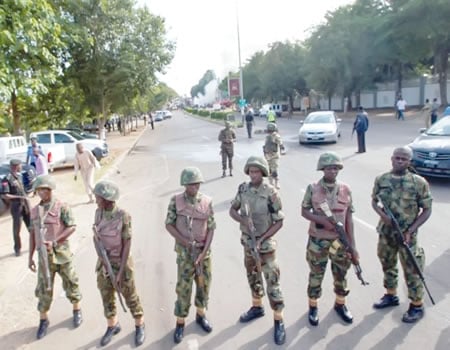The military, more broadly, plays a vital role in the security of the country, but has national defence as its major responsibility. The role of the military is not to maintain internal order or to enforce the law. That is the prime responsibility of the police. What the current deployment of the army means is that the police are unable to rise up to the challenge of maintaining law and order within the country. It may also mean that the Nigerian state is increasing faced by desperate situations of internal security that are beyond the capacity of a normal police force.
The untoward security implication of this type of deployment may not be immediately obvious if solace is taken in the fact that the constitution demands that the military be called upon in aid of civil authorities to maintain order in the country when the need arises. But it is certainly not the intention of the writers of the constitution that the military be deployed for police duties for such length of time in significant numbers. Such long-term major deployments reflect a state of emergency beyond the capacity of the regular police. If that is not the case, the alternative will be that the police have become so weak that they cannot carry out their routine functions without help from the military.
Whatever is the case, there are serious issues to be addressed. The desperate internal security situation calls for a long-term strategy to deal with the worsening cases of crime. The government should look beyond the military in addressing the issue of crime and policing. It is known worldwide that certain socioeconomic and governance factors lead to an increase in both rates and gravity of crime that pervade society. These factors include unemployment, poverty, inequality, weak law enforcement and injustice. The government must work hard to reduce unemployment among the youths and also reduce poverty in the country. Furthermore, the government must ensure that police reform is given a priority. This should include building the capacity of the police by providing them with equipment and logistic support. It should also include the retraining and reorientation of officers and men of the police with appropriate skills and values.
The military may be legitimately called upon to act in aid of civil authority, but they are not set up essentially for police duties. Frequent and long term deployment of the military to police duties is neither in the interest of the military as an institution nor in the interest of democracy and civil culture. An important member of the military has made this point in very clear terms. While delivering a public lecture at the University of Ado-Ekiti, Ekiti State, in August 2010, the then Chief of Air Staff, OluseyiPetinrin, remarked that the frequent use of the military in internal security creates problems for the management of civil-military relations and might lead to the militarisation of the polity.
Indeed, Dogara’s complaint about the increasing militarisation of democracy in Nigeria has a base on experience. Earlier, the army operations in Ayakoroma area of Niger Delta raised a lot of controversies and conflicting reports following alleged massive civilian casualties. In similar military operations in Odi, Zaki Biam, and Onitsha, the military was accused of excessive use of force, looting, rape and torture of citizens. These incidents have portrayed the military in bad light. Besides, the frequent involvement of the military in police duties detract from the time and resources it has to focus on its primary responsibility which is the defence of the territorial integrity and core values of the country against external aggression. The government must provide a comprehensive national security framework for cooperation among all security agencies. This is necessary to ensure synergy among the various agencies in order to avoid situations that blight the image and readiness of the military by overexposure to police duties.






